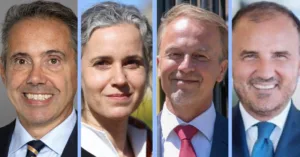Brussels – The new term of EU special representatives just approved by the Council of the European Union also includes two Italian diplomats, one with a new role and one confirmed in his post serving the interests of the Twenty-seven in key countries and regions of the world. Luigi Soreca was appointed EU special representative for Bosnia and Herzegovina, while Emanuela Claudia Del Re was confirmed until Nov. 30 for the Sahel region. The share of Italians out of the total 11 EU special representatives thus rises to three, given also the position taken on in May last year by Luigi Di Maio for the Gulf region.

Four new names and three extensions received the green light from the EU Council today (July 26). In addition to Soreca for Bosnia and Herzegovina (with a two-year term) and Del Re for the Sahel region (confirmed for another four months), as of Sept. 1, Sweden’s Johan Borgstam will be assigned to the African Great Lakes region (for one year), Czech Magdalena Grono will be in charge of Southern Caucasus and Crisis in Georgia (for one year) and Estonian Aivo Orav of Kosovo (for two years), while Slovakian Miroslav Lajčák will remain until January 31, 2025, for the Belgrade-Pristina Dialogue and other Western Balkan regional issues, and German Annette Weber until August 31, 2026, for the Horn of Africa.
“I am proud to have been appointed by the Council of the European Union as the Special Representative for Bosnia and Herzegovina,” is Soreca’s comment in a post on X, recalling the “crucial moment in the EU integration journey” for the Balkan country after the European Council’s decision last March 21 to start accession negotiations (although the road remains strewn with numerous institutional obstacles). The Italian diplomat and lawyer, at the European Commission since 1998, was appointed EU special envoy to Italy in 2016 to initiate the relocation process of refugees and migrants. Between 2018 and 2022, he was head of the EU delegation to Albania and, for the past two years, has served as EU special envoy for the external dimension of migration at the European External Action Service in Brussels. As of Sept. 1, he will succeed Austria’s Johann Sattler in the mandate to “ensure continued progress in the stabilization and association process” of a stable, thriving, peaceful, multi-ethnic, and united Bosnia and Herzegovina, cooperating peacefully with its neighbours and moving towards EU membership,” reads the Council’s note.
What EU special representatives do
 EU Special Representatives promote the Union’s policies and interests “in specific regions and countries” and play an “active” role in efforts to consolidate peace, stability, and the rule of law, reads the page of the European External Action Service (EEAS) dedicated to figures who support the work of the EU High Representative in the regions concerned. These representatives provide the Union with an “active political presence” in countries and regions considered key to the Twenty-Seven, acting as the “voice and face” of EU policies.
EU Special Representatives promote the Union’s policies and interests “in specific regions and countries” and play an “active” role in efforts to consolidate peace, stability, and the rule of law, reads the page of the European External Action Service (EEAS) dedicated to figures who support the work of the EU High Representative in the regions concerned. These representatives provide the Union with an “active political presence” in countries and regions considered key to the Twenty-Seven, acting as the “voice and face” of EU policies.
To date, ten special representatives are developing EU foreign and security policy, and they will rise in just over a month to 11 with the reopening of the position in the African Great Lakes region: in Bosnia and Herzegovina (Johann Sattler, from Sept. 1 Luigi Soreca), for Central Asia (Terhi Hakala), for the Horn of Africa (Annette Weber), for Human Rights (Eamon Gilmore), for Kosovo (Tomáš Szuyog; Aivo Orav from Sept. 1), for the Middle East Peace Process (Sven Koopmans), for the Sahel (Emanuela Claudia Del Re), for the Southern Caucasus and the crisis in Georgia (Toivo Klaar; Magdalena Grono from Sept. 1), for the Great Lakes (from Sept. 1, Johan Borgstam), for the Belgrade-Pristina Dialogue and other regional issues in the Western Balkans (Miroslav Lajčák), and for the Gulf (Luigi Di Maio).
English version by the Translation Service of Withub



